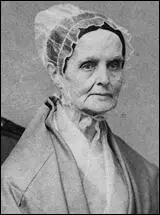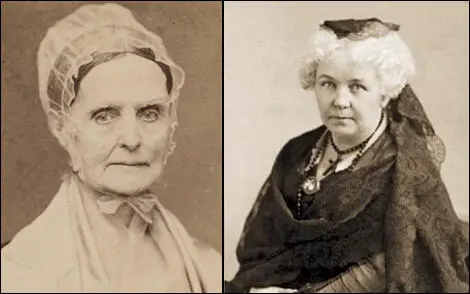Lucretia Mott

Lucretia Coffin was born in Nantucket, Massachusetts, on 3rd January, 1793. At the age of thirteen Lucretia was sent to a boarding school run by the Society of Friends. She eventually became a teacher at the school. Her interest in women's rights began when she discovered that male teachers at the school were paid twice as much as the female staff.
In 1811 Lucretia married James Mott, another teacher at the school. Ten years later, she became a Quaker minister. Lucretia and her husband were both opposed to the slave trade and were active in the American Anti-Slavery Society.
In 1840, Mott and her friend, Elizabeth Cady Stanton, travelled to London as delegates to the World Anti-Slavery Convention. Both women were furious when they, like the British women at the convention, were refused permission to speak at the meeting. Stanton later recalled: "We resolved to hold a convention as soon as we returned home, and form a society to advocate the rights of women."
However, it was not until 1848 that Mott and Elizabeth Cady Stanton organised the Women's Rights Convention at Seneca Falls. Stanton's resolution that it was "the duty of the women of this country to secure to themselves the sacred right to the elective franchise" was passed, and this became the focus of the group's campaign over the next few years.

In 1866 Mott joined with Elizabeth Cady Stanton, and Lucy Stone to establish the American Equal Rights Association. The following year, the organisation became active in Kansas where Negro suffrage and woman suffrage were to be decided by popular vote.
Lucretia Mott, who remain active in the woman's rights movement into her seventies, died in Abington on 11th November, 1880.
Slavery in the United States (£1.29)
Primary Sources
(1) Carl Schurz first met Lucretia Mott in 1854. He described her in his autobiography published in 1906.
Lucretia Mott, a woman, as I was told, renowned for her high character, her culture, and the zeal and ability with which she advocated various progressive movements. To her I had the good fortune to be introduced by a German friend. I thought her the most beautiful old lady I had ever seen. Her features were of exquisite fineness. Not one of the wrinkles with which age had marked her face, would one have wished away. Her dark eyes beamed with intelligence and benignity. She received me with gentle grace, and in the course of our conversation, she expressed the hope that, as a citizen, I would never be indifferent to the slavery question as, to her great grief, many people at the time seemed to be.
(2) Editorial, Time and Tide (9th July, 1926)
Feminism, like any other great movement, proceeds at varying paces and in varying forms in different countries. Few things are more enlightening than a study of the inter-reactions of the feminist movement in the two great English speaking peoples during the past seventy or eighty years. It is curious how closely related have been the movements on the two sides of the Atlantic. Each has continually learnt from the other. Beginning with Mary Wollstonecraft in the late 18th century, the feminist movement owed its next big impetus (in the eighteen forties and fifties) to Lucretia Mott and Susan B. Anthony, of New England. It was Lucretia Mott and Elizabeth C. Stanton who organised the first Equal Rights Convention which was held in New York in 1848; and it was Lucretia Mott who laid. down the definite proposition which American women are still struggling to implement today: 'Men and Women shall have Equal Rights throughout the United States.' A few years later Susan B. Anthony, the pioneer Suffragist, came into the American movement.
It was not till the eighteen sixties that the political feminist movement came alive in Great Britain. Dame Millicent Fawcett was even in those early days one of the leading names connected with it. The British suffragists pushed forward enthusiastically for some twenty years, but the failure to achieve success in 1885, when the third Reform Bill was passed giving the agricultural labourer the vote, seemed to take the heart out of our early suffragists, and the movement died down again. Meanwhile, in the nineties the American women were full of life and enthusiasm, winning victory after victory in State after State.'
In 1902 Susan B. Anthony came to England and stayed with Mrs. Pankhurst in Manchester. The result of that visit was far-reaching. All unwittingly the old pioneer handed back the torch to the British suffragists. 'It is unendurable,' declared Christabel Pankhurst after her departure, 'to think of another generation of women wasting their lives begging for the vote. We must not lose any more time. We must act.' Those words heralded the birth of the British militant movement. From that moment onwards British feminists went forward without pause till the outbreak of war in 1914 and when that time came (although the actual Bill was not passed until 1918) the first instalment of victory was virtually won.
Meanwhile in America by 1912 things had died down to very much the same state as the English movement has been in since 1918. Votes had been achieved in a considerable number of States, the feeling was widespread that a partial victory was good enough for the moment and that complete victory would ' come all in good time without much further trouble. And then in 1912 Alice Paul, lit by the fire of the English militant movement, returned to America - and America woke up. It took the Americans just eight years from that date to achieve complete political equality; but they were under wise leadership (Alice Paul will surely go down to history as one of the great leaders of the world), and when they did achieve political equality they did not make the mistake of supposing that that was the end. They turned back to the 'declaration of sentiments' laid down by Lucretia Mott in 1848 and they realised that political equality was only the first step on the path which they had chosen and that there could be neither halting nor relaxing their pace until they had come to the end of that path.


